The Blind Side
 for one scene involving brief violence, drug and sexual references.
for one scene involving brief violence, drug and sexual references.
Reviewed by: Scott Brennan
CONTRIBUTOR
| Moral Rating: | Better than Average |
| Moviemaking Quality: |
|
| Primary Audience: | Adults Teens |
| Genre: | Sports Drama Comedy |
| Length: | 2 hr. 6 min. |
| Year of Release: | 2009 |
| USA Release: |
November 20, 2009 (wide—3,100+ theaters) DVD: March 23, 2010 |
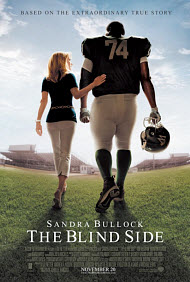



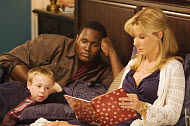
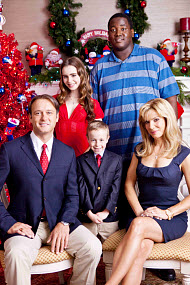


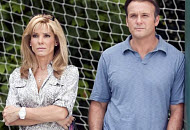
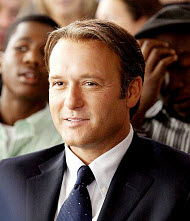
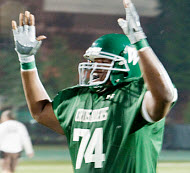
| Featuring |
|---|
| Sandra Bullock (Leigh Anne Tuohy), Tim McGraw (Sean Tuohy), Kathy Bates (Miss Sue), Quinton Aaron (Michael Oher), Jae Head (S.J. Tuohy), Lily Collins (Collins Tuohy), Ray McKinnon (Coach Burt Cotton), Kim Dickens (Mrs. Boswell), Adriane Lenox (Denise Oher), Catherine Dyer (Mrs. Smith), Andy Stahl (Principal Sandstrom), Tom Nowicki (Literature Teacher), Libby Whittemore (Sarcastic Teacher), Brian Hollan (Jay Collins), Melody Weintraub (History Teacher), Sharon Morris (Investigator Granger), See all » |
| Director |
|
John Lee Hancock “The Rookie,” “The Alamo” |
| Producer |
| Alcon Entertainment, Zucker/Netter Productions, Timothy M. Bourne, Yolanda T. Cochran, Broderick Johnson, Andrew A. Kosove, Gil Netter, Molly Smith, Erwin Stoff |
| Distributor |
“Blind-sided” might well have described me this past June, when I slipped into a theater to catch Sandra Bullock in “The Proposal”—something I should never have done without having read some reviews on Christian Spotlight in advance. Like many “believers,” I was offended by several things in the film, not the least of which was the gratuitous nude scene that Sandra agreed to do for director, Anne Fletcher. Call me naïve, but it just didn’t fit with the girl-next-door image Miss Bullock had been known for in previous romantic comedies. That being said, I entered the theater today to see her newest film, “The Blind Side,” with my guard up.
Fortunately, I didn’t have to keep it up for long. It was clear within about 30 minutes that this was going to be a very different kind of film. That’s not to say that this is a family movie by any means. It earned the PG-13 rating it received, and, from a Christian perspective, there were a couple of difficult scenes laced with drugs, violence, and sexual innuendo to be endured during the film. Nonetheless, the director was well able to communicate the importance of family, and “doing good”—“Because it’s the right thing to do,” as Bullock’s character announced early on in the film. In addition to directing this film, John Lee Hancock (“The Rookie,” “The Alamo”) also wrote the screenplay as an adaption of Michael Lewis’s book, The Blind Side: Evolution of a Game.
The genre is a familiar one: a sports-oriented spectacular that fills the screen, plays on the heart, and is often based on a true story—“Remember the Titans” and “Cool Runnings” come to mind. The good news for many potential viewers of “The Blind Side,” is that it’s about football, and I’m not just talking any football. I mean southern college football, which is a world unto itself. Fans of college football will love the appearances of coaches like Phil Fulmer, Tommy Tuberville, Houston Nutt, Lou Holtz and Nick Saban who play themselves in the film—all basically chomping at the bit to get the main character, Michael Oher (Quinton Aaron) to accept a scholarship with their school. But for those who aren’t even armchair quarterbacks, and really don’t know the difference between a field goal and a touchdown, you won’t feel left out. The movie isn’t really about football. It’s about choices. Often those choices are difficult, and they present themselves at the most unlikely times, hence “The Blind Side,” theme.
Don’t get me wrong, for the superficial viewers, there’s plenty of football, tackles, slow motion replays and an enthusiasm for the game throughout the film, and they won’t be disappointed. But let’s face it, if the only conflict in a film (or in life) is learning how to overcome your opponent on a football field while becoming a top offensive left tackle, then you don’t have much of a story, now, do you. Hancock takes us on a journey into the lives of a well-to-do, upper middle class white family (who loves football—nearly to the point of idolatry) and exposes us to situations that they are faced with as a Michael Oher emerges on the stage of their seemingly perfect life.
At the helm of the family is Sean Tuohy, Taco Bell owner and Tennessee businessman, portrayed by Tim McGraw, who seemed to adapt nicely into his role as husband and father. But it was Leigh Anne Tuohy (Sandra Bullock) who was the tough, charismatic, and feisty southern belle who lit up the screen, and pretty much ruled the roost as the matriarch—pretending to acquiesce to her husband when necessary. On a surface level, her sassy, strong performance satisfies the audience, but her character runs deeper, and it shows.
That leads to the next level of viewer—one that looks for the subplots. I have already heard that some critics are talking about “white guilt” and how the movie seemed to exaggerate on that theme, detracting from the overall storyline. (I disagree with that characterization. I don’t think it was about white guilt at all. They missed the point.) Some liked the emphasis on education and its importance in maintaining good standing in both high school and college sports. But the more powerful insights for this level of viewer will be developed from watching Michael grow as a young African-American teen—one that was swooped up out of a life of homelessness and misery into a world he knew nothing about, and then be challenged to achieve his full potential.
This is done in with a superb performance by Jae Head, who plays SJ (Sean Jr.) Tuohy, and creates an inspiring, fun-loving, color-blind brother that the audience falls in love with in every scene. In addition, Quinton Aaron, newcomer to the big screen, seemed to find his niche and communicated a more than believable Michael Oher. Other supporting roles by the Tuohy sister Collins (Lily Collins), the high school coach (Ray McKinnon), as well as his tutor from Ole’ Miss (Kathy Bates), also helped make the film gel as a whole.
This leads to my final comments for the believer. Woven throughout the film is an ongoing sense of “thanksgiving”—one that we as believers should always have running in the background on our spiritual hard drives (1 Thes. 5:15). There were a few really great moments in the film when Leigh Anne truly took stock about how much God had blessed her and her family, and she communicated those moments with just a look or a touch, subtly yet powerfully. But the amazing part was that she didn’t really see it, until she had stepped out of her comfort zone and acted as the Good Samaritan did in the biblical parable of the same in Luke 10. And Jesus asked “who was the righteous one?” inferring the Good Samaritan. And the man replied, “The one who showed him mercy.” Then Jesus said, “Yes, now go and do the same.” The tipping point for me (in terms of deciding whether or not this film was worth the price of admission) came when Leigh Anne (Bullock) met with Michael Oher’s mother in the film to ask for permission to do something (won’t spoil), and showing mercy just like Jesus commanded in that parable. There wasn’t a dry eye in the house. That’s the kind of moment you look for in every film.
Objectionable issues
Those positives aside, there were a few spots that could have been edited out, and it wouldn’t have made the film any less powerful or believable. The use of the words “Mother of God” as a response from the coach (sure to offend some Catholics), the arbitrary use of the words: “ass” (1) “frickin’, (2) “fat a_s” (1)—although they built into the script Leigh Anne saying, “We don’t use that word in this house,” bit_h (2) and “dam_” (1 time). In addition, Leigh Anne said a couple of things that seemed out of character for her role—like the “b” word and “I’m packing’” along with, “Michael, if you get any young woman on this campus pregnant, I’m gonna come down here and cut your pen_s off!” And finally, when she made the comment about Nick Saban, “I find him extremely attractive,” and did so right in front of her husband. It may have happened in real life, but I didn’t buy it, and it still played poorly on screen. The other sexual innuendos and drug scenes were short and important for the storyline, but may be objectionable for some viewers. And finally, the length of the film was a bit much, although, I so appreciate the work of artists—that I wouldn’t have known what to cut either.
Positives
With those negatives out of the way I’d like to end on a more positive note. For the mature Christian, you can’t watch the film without being challenged as to whether or not you are really “walking the walk.” And even after you “do what is right,” you need to check the motives of your heart, just like Leigh Anne and Sean did in the film. Not wanting to reveal the dénouement, I won’t say more than that. But what I will say is that Christians will be known for what they do, and how they love one another—far more than for what they say. The Tuohy’s actions were not fiction, and their story will be told around the world, and let the praise go to God. I caught a recent clip of Sandra Bullock sharing about how she’d finally seen someone in her life (speaking of getting to know Leigh Anne) that really lived what she believed and didn’t just preach about it. This ordinary event had an extraordinary outcome, simply because one person made a “choice” to do the right thing in the “valley of decision.” There is always someone hanging by the sidelines saying things like, “why can’t something like that ever happen to me?” Leigh Anne Tuohy has an answer for that:
“I am telling you there are Michael Ohers everywhere—wonderful kids who need a home, who want a family. It doesn’t take much searching out, because they are right under your nose. And they don’t need to be brilliant at football. They don’t need to be someone who excels at anything other than loving you and wanting love in return.”
Do you need to see this movie to get these insights? Probably not. Should you? That will have to be your decision. But I will say this, if I had to spend time with my teens in a movie theater over the holidays, it would most certainly be watching this film instead of one about ungodly attractions between vampires and humans. Besides, not since the movie “Crash,” has Sandra Bullock demonstrated this kind of artistic talent on screen. I’m hearing the Oscar buzz already. For the rest of you, pop your popcorn and wait for the DVD. But for all us, this line from the film applies no matter what we do: “Life—It’s about to be defined by what you cannot see.” That is “the Blind Side.”
Violence: Moderate / Profanity: Mild / Sex/Nudity: None
See list of Relevant Issues—questions-and-answers.


The movie is not for children, and the PG-13 rating is appropriate because of language, adult situations, violence, and some sexual references; however, the film is real-to-life and inspirational, something that so many films lack these days. The makers do acknowledge the value of the Christian faith but do not present the Gospel, instead referring to “what is right” in reference to caring for others. Regardless, the film values family, marriage, friendship, education, and the value of looking past what might create bias and loving people because they are people. As an educator, I appreciate the emphasis on good scholarship, even if the motive is athletics.
***SPOILER*** The value of children, even the unwanted, is woven throughout the story, as Michael is the son of a drug-addicted mother and no one knows who; even he doesn’t recall who his father is and cannot respond when he learns that his father has died. But his “new” family wants him, regardless of his less-than-stellar school performance and before they know of his abilities as a football star. They love this boy because he needs them, and they come to realize they need him, too. ***END SPOILER
All in all, the inspiration of this movie and the message that those who have so much in America can share, give to others, love others, and yes, break the barriers of economic background, skin color, etc.
Take Kleenex and be prepared to realize that you, who just paid $8 to see this movie, really are very spoiled. We’ll go see this several times in the theater and purchase this one when it comes out on DVD. And yes, Sandra Bullock deserves an award for her part in this film.
Moral rating: Good / Moviemaking quality: 4½
What makes it an even better movie is that it is about real people and about things that really happened, and despite bumps along the way, it has a happy ending. I applaud this family for doing what they did. Fortunately, God blessed them with the resources to do so… and they were good stewards of God’s blessings. While I may have made this sound a little “preachy”, the movie is not. It’s a great movie, period.
Moral rating: Better than Average / Moviemaking quality: 4½
Moral rating: Better than Average / Moviemaking quality: 4
Moral rating: Better than Average / Moviemaking quality: 4½
Moral rating: Average / Moviemaking quality: 5
Moral rating: Excellent! / Moviemaking quality: 5
Moral rating: Average / Moviemaking quality: 5
Regarding “objectionable” elements: only 2 naughty words were spoken by the good guys and the speaker in the first instance was reprimanded for doing so. The hoodlums were the source of the rest of the language and either directly or indirectly were the source of the violence as well. The bad guys were bad and the good guys were truly good. Evil conduct was never portrayed in a positive light. Way to go producers!
I will say that Sandra Bullocks dresses were sometimes a little immodest but not horribly so. The line of “cutting off your penis” was spoken in jest to her college age son. I did cover my daughters ears for that and my daughter thought “arm” was spoken of instead.
Moral rating: Better than Average / Moviemaking quality: 5
However, “The Blind Side” is not without its faults. What my family and I found the most offensive were the clothes worn by some of the female characters in the film. Almost every style that the character Leigh Anne wears is short, tight, and low, so I am embarrassed that Christian women were portrayed as “stylish” sluts. There are also several words that the movie could easily have done without. As someone already pointed out, this film does not at any time give the gospel message… it simply presents Christians as “good” people. In the end, I still say that I enjoyed seeing “The Blind Side.” And DO bring some Kleenex!
Moral rating: Better than Average / Moviemaking quality: 4
Moral rating: Better than Average / Moviemaking quality: 5
As far as the scenes and language, I was glad to see a SECULAR movie made with much less junk than it could have had. MEN being wimps… that’s how they were… IT’s A TRUE STORY…so now we get into how real men should act. This is how they did… You could not ask for a person that loves the Savior anymore than me, but sometimes we think everything that the world says and does is suppose to be just for Christians. This attitude is what turns others from wanting to be a Christian.
Personally, I did not feel that my Lord was victimized by this movie only that Hollywood had to stick in some kind of curse word or skin scene in there to make it not too nice!!
The overall message was excellent. Maybe a non-believer will see it and see Christ through this family’s mercy for others, even though none of them were perfect themselves. If I had younger children at home, they could not watch it, but older children, I would review the movie and let them know what to expect as far as language etc. But the biggest thing I would tell them is how loving and showing mercy to others is what God wants us to do in this “world.
Moral rating: Better than Average / Moviemaking quality: 4
Other things that concerned me: The drug scene where Michael is asked if he’s “tapped that” referring to the young girl he is living with. The drug using could have been implied without showing that… ; When the mother says… IN FRONT of her daughter AND husband that she thinks another man is attractive; The bedroom scene with Bullock and her husband; and; finally, at the end—about cutting Michael’s pen_s off if he gets some girl pregnant.
This was a good story, but because of the stuff I just mentioned, not edifying in my opinion. It’s a shame that movie makers, feel they have to inject filth in order to appeal to the people.
Moral rating: Better than Average / Moviemaking quality: 3½
I must STRONGLY disagree with the portrayal of the mother being the head of the house in the movie. Yes, the husband is the head of the house, and the wife is submissive. But the husband is commanded to “love your wives, even as Christ also loved the church, and gave himself for it.” In my view, the husband in this film loved his wife so much that he allowed her to have what she wanted; he knew it was what would make her happy. I did not see a wife who just got whatever she wanted because she was bossy. In the film, she talked with her husband about having Michael stay permanently before anything was done. It was obvious he knew his wife completely, and knew what makes her happy. It’s not a bad thing, nor is it submissive for a husband to put his wife’s happiness over his own. After all, Christ sacrificed himself for the church, so shouldn’t a husband be able to sacrifice what he wants for his wife.
Myself, unless I am strongly against something, my wife at times gets what she wants even if it’s not exactly what I want, simply because I love her and want her to be happy; THAT is my place in my marriage. If it is something I don’t want and believe it should not happen; trust me, it won’t happen. Furthermore, the film doesn’t show the actual day-to-day life of the family. How are we to know that the husband “put his foot down” on other occasions? It is unfair to make an assumption about how a family operates daily with only a small taste of what they do daily.
Moral rating: Better than Average / Moviemaking quality: 4
Moral rating: Better than Average / Moviemaking quality: 5
Moral rating: Good / Moviemaking quality: 4½
Moral rating: Better than Average / Moviemaking quality: 3½
That being said, the characters in this movie acted well, the script was uplifting and left me thinking about what I can do for others. It gave me a different perspective on how I should live my life as a christian and challenged me to think about how I can use the resources I was blessed to have in order to help others. Whether “stated” or not, the family portrayed definitely showed the love of Jesus to this poor boy, and changed his life for the better. If you go into the theater with the expectation that not everyone in our world is a believer, and even Christians are not perfect, you will probably be ready to purchase this movie afterward. I know I did.
One last comment—I think it is unfair for the commenters… to rudely criticize movies with positive messages. To me, if you can’t even see good in THIS movie, you may as well never see another movie—because this kind of positive movie doesn’t even come around but once in a blue moon.
Moral rating: Excellent! / Moviemaking quality: 5
Moral rating: Good / Moviemaking quality: 5
Moral rating: Good / Moviemaking quality: 5
Another thing, is the fact that in just about every movie of this kind, it is mostly a black or Hispanic who is the beggar and the white as the one who is to blame. There are tons of white beggars and rich blacks and Hispanics. I’m not a racist at all, and if I were black or Hispanic, and it was the other way around, I’d say the same thing. This comes off as a propagandist message, that whites are to blame for the woes of the others. I am NOT against them AT ALL!!! I do think that something NEEDS to be done for all those who are troubled and come from such neighborhoods, whether white, black, Hispanic, or Chinese.
One other objection, is the idea of the “Christians” in this movie. If these are Christians, then why are they not acting like Christ and obeying His laws?!!! The women wear pants (Deut. 22:5), the women dress gaudy and flaunt their wealth (1 Pet. 3:3 just to name one), and Leigh Ann (Sandra Bullock) is not submissive to her husband, acts like the head of the home, and is a busybody (Titus 2:3-5; 1 Tim. 2:11-15, 5:14; Prov. 31; 1 Cor. 7:34). All scriptures are located in the KJV. Other than that, the movie was good, whether you like football or mission work. GOD BLESS!!
Moral rating: Better than Average / Moviemaking quality: 4
It’s also really neat when Michael stands up for what he believes when he goes back to visit the friends or acquaintances that he used to have and grew up around. He doesn’t choose to run in or fall into the way of sexual immorality and lusting and going after immorally the Touhy daughter. I think we see a good biblical anger in this movie against things that are wrong, hypocritical, and sinful--yet at least in the case with Michael-I feel that he took it into his own hands and didn’t leave that part to the Lord.
Sacrifice is portrayed as being very good and what we should do--one such instance is when Michael covers Sean and takes the hit of the airbag to protect him. The story is just really neat how Christ turned things upside down and used people to reach out to others and totally work through that. There are so many people who need him and who need care and love and Christians need to be doing it and showing it and sacrificing. Many times the characters in this film had to persevere and continue to seek and go after love and keep with it even though there were problems or doubts and complications that came up. This is really true in the walk of a Christian.
I drive a school bus for children that go to special ed school due (I think) mostly for disobedience problems and not behaving--and I can say that this is really needed as a Christian--ask God for the perseverance that only He can give. There are so many people who need Him and His love.
That being said, there are also quite a few negatives and the biggest one being that of not the true woman and mother role in the household and a totally bad portrayal and portrayal of it being okay and/or normal the role that men play in this film. Mrs. Touhy is the one in charge it seems of the family and makes the ultimate calls--as the husband sort of steps aside and lets it happen and doesn’t think or realize that he must be evaluating and making the ultimate decision or being okay with it. This is not okay--for the man is to be the spiritual leader and head of the household and the wife is to be submissive. The man is to respect and love his wife even as Christ loved the church. There should be equality yet different roles. Yet that is not portrayed as the way it should be in this movie and the former is totally promoted and accepted as okay and normal. Men need to step up and lead their families in a godly way that pursues Christ and His will and challenges the family to go that way and to follow Christ. He should be a servant leader. See Ephesians 5, Mark 10:45, Colossians 3:18-25, 1 Corinthians 11:1-22, Titus 2, and 1 Peter 3:1-7.
Many times too Mrs. Touhy seems to do good things and sacrifice out of pride and wanting to be in control and seems to do things in a very worldly and ungodly way and in a way as wanting to be in charge. There is lots of lusting that occurs for Mrs. Touhy such as when she is walking through the poor neighborhoods and other times also I think--yet it is portrayed as not good and seems to be portrayed as being bad and wrong. I would say that the violence and lifestyle that is portrayed by Michael’s old friends seems accurate and that the lifestyle and ways that many of the wealthy people who are also going to the Christian school or send their kids there (but many may not be true Christians) are portrayed accurately as self-righteous and not willing to reach out to people who are different in appearance or background then them and not being surrendered to Christ. It’s hard to watch some of the things that the Touhy’s as a family do because of those things being unbiblical and not seeming to be in surrender to and obedience to Christ.
Overall-there are some messages in the movie that are wrong and unbiblical (the biggest one in my opinion being that of the role of men/women) and the way in which Mrs. Touhy goes about doing what she knows is the right thing to do. However-I think that the movie has some values that are excellent and that are really challenging as a Christian and encourage us to love others as ourselves and promote reaching out and being a good Samaritan and being willing to sacrifice and do what God asks of us to do.
Moral rating: Average / Moviemaking quality: 4
Other than that, I found the movie very well done good story and good moral value.
Moral rating: Better than Average / Moviemaking quality: 3½
Moral rating: Better than Average / Moviemaking quality: 4½
Moral rating: Offensive / Moviemaking quality: 2
Moral rating: Offensive / Moviemaking quality: 2½
The best character was the guy and the kid. And Sandra Bullocks supposed friends in the movie were horrible, I got really annoyed hearing the script. On the school building it says “With men things are possible” or something like that, they kind of twisted Scripture. It says With men its impossible but with God anything is possible. Or something like that.
Moral rating: Offensive / Moviemaking quality: 1½
Sandra Bullock did an excellent job, as did all the other actors, but that one scene in which Leigh Anne pokes fun at the President should have been deleted, regardless of whether it occurred in real life.
Moral rating: Extremely Offensive / Moviemaking quality: ½
Moral rating: Offensive / Moviemaking quality: 2
Moral rating: Offensive / Moviemaking quality: 5
As far as Sandra Bullock goes, I was shocked that she was even nominated for an Oscar, because she showed no depth of character, nor did the director or the writer try to develop her character. She was a comic book version of the real mom. Yeah, she had serious frowns and a sad face now and then, and even got mad and had a good southern accent—but her role was flat and reminded me of every other movie she’s been in.
There was, also, no depth to the film—no real tension or drama. It seems that Hollywood thinks that people who want wholesome films don’t care about the integrity of art and are satisfied as long as there is no sex, violence, and the kids don’t say “whatever” to their parents. Thus, Hollywood, in order to give this audience (Christian and non-Christians with solid values), a movie they think they’ll like—they give us a film depicting a perfect family, one that none of us have or could hope to have. Hence, they give the unbelieving world, yet another reason to see us as hypocrites, because we don’t live up to that model. As Christians I think we ought to train ourselves to appreciate art that is excellent and that glorifies God. Not just accept any old thing because it is merely inoffensive. Really beautiful art reflects the beauty of God and his creation and should be something wonderful that has integrity and is true.
Now, it is laudable and refreshing that a film should avoid graphic scenes of people committing the most heinous sins, but the reality of life is that we struggle daily in our hearts and aren’t kind to each other, at all. You can show that drama without graphic scenes. Just because we want to see wholesome movies doesn’t mean we want to see movies where people are painted as perfect. That’s a lie.
And that brings me to my last—and I think most important point; the film was spiritually heretical and dangerous, in a way. It was a redemption story, and that is very good. Most films have redemption themes that point us towards our Savior. Michael (in the film version of the story) had his life redeemed. God uses instruments, us, to do His will and lead people to salvation. In this film, there was only physical redemption. We didn’t see anyone in the film sinning big time or even a little bit, except poor Michael’s mother, and she didn’t get redeemed. The boy’s life was redeemed, but he was portrayed totally as a victim (in the movie version); you see him only as a figure who has been sinned against. He never does anything sinful in the movie; he is totally good. I have a problem with this, because it is the new message in churches that says: “We are all broken by the sin in the world and need a Savior. The Bible tells us that others may have hurt and maimed us, but we are broken by and responsible only for our own sin. We can’t save ourselves or find excuses for our sin; that’s why we need as Savior. If we can save ourselves or aren’t responsible, what’s the point of Jesus’ life?
Having said all that, who was the boy’s redeemer? You could say God used Sandra Bullock, but wait! Sandra Bullock was portrayed as a perfect person. So Sandra, though she didn’t die for the boy, was (in the film only) a perfect person, and, as such, his Redeemer. But worse, she was a female Redeemer. This makes her appear to be something like a pagan goddess, the worship of which is prevalent in our society today. The husband, who should have been the leader in God’s economy, stepped back and let her make all the decisions, which is, also, a prevalent theme, and deemed good in our society.
I heard it said that there are five gospels, and that most people have never read the first four. The fifth gospel is us. I don’t think we should let Hollywood make caricatures of us which show us as perfect. That takes away our witness. We sin, our kid’s sin. It’s one step forward and one step back on a daily basis, but we have the victory in Christ , and that’s our real and only witness. What makes us beautiful is that we are full of sin, but redeemed and stand beautiful before God only through Christ and repentance.
If the mother had been portrayed as someone flawed, yet who was able to stand by that boy and love him despite all the difficult and sinful problems that she must have encountered with her husband, and kids and Michael himself, I would have loved that film.
Moral rating: Average / Moviemaking quality: 1
Moral rating: Better than Average / Moviemaking quality: 4½
Moral rating: Excellent! / Moviemaking quality: 5
Moral rating: Excellent! / Moviemaking quality: 5
Moral rating: Better than Average / Moviemaking quality: 4½
This movie was a real PG-13 movie. There were words that little children should not hear. This movie is a great movie to see with teens and parents. It is definitely worth your money.
Moral rating: Good / Moviemaking quality: 5
Moral rating: Excellent! / Moviemaking quality: 5
Moral rating: Excellent! / Moviemaking quality: 5
Moral rating: Better than Average / Moviemaking quality: 4
Moral rating: Good / Moviemaking quality: 4½
Moral rating: Better than Average / Moviemaking quality: 5
Moral rating: Good / Moviemaking quality: 4½
Moral rating: Better than Average / Moviemaking quality: 5
Moral rating: Excellent! / Moviemaking quality: 5
Moral rating: Excellent! / Moviemaking quality: 5
Moral rating: Better than Average / Moviemaking quality: 5
Moral rating: Excellent! / Moviemaking quality: 5
Moral rating: Good / Moviemaking quality: 5
Moral rating: Better than Average / Moviemaking quality: 4
Perhaps there was a good message, but the message would be lost for the place of promiscuity. How can we hear a good message from a bad root. We are commanded in the bible to abstain and make no provision for the flesh. Please keep your teens away from this movie.
As to the actors in the movie, I pray that you know the power of God`s loving grace in your life. It saddens me that you have to resort to cosmetic surgery to have an acceptance. I assure you that God loves you with all wrinkles and blemishes, and I urge you to receive Jesus Christ`s FREE gift of salvation and know the power of forgiveness of sins. Such amazing peace and joy will fill your heart and your life, and you will be changed forever and your eternity will be sure. Jesus says that He came not into the world to condemn, John 3:17 “For God sent not his Son into the world to condemn the world; but that the world through him might be saved.” John 3:18 “He that believeth on him is not condemned: but he that believeth not is condemned already, because he hath not believed in the name of the only begotten Son of God.” Therefore, come freely to His throne of grace, God is not ashamed but waits. With deep and sincere love, Sarah
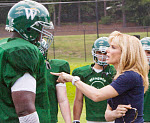


In addition there is also a contrast between a kind gentle spirited person who is willing to take the help available to make themselves better and those with a chip on their shoulder because of their situation who are unwilling to work themselves into a better one. I was most upset at the scene where Michael was being questioned by the women from the NCAA but I was calmed down when he set her straight in a later scene.
I think the best line of the movie is when one of Leigh Anne Tuohy’s friends says to her “You’re changing that boys life” and she replies “No, he’s changing mine”. I wouldn’t say that it changed my life but it sure made my day!
My Ratings: Moral rating: Better than Average / Moviemaking quality: 5